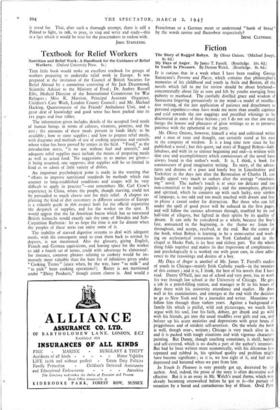Nutritton and Relief Work : A Handbook for the Guidance
of Relief Workers. (Oxford University Press. 5s.)
Textbook for Relief Workers
Tins little book would make an excellent textbook for groups of workers preparing to undertake relief work in Europe. It was prepared at the invitation of the Council of British Societies for Relief Abroad by a committee consisting of Sir Jack Drummond, Scientific Adviser to the Ministry of Food ; Dr. Audrey Russell Ellis, Medical Director of the International Commission for War Refugees ; Miss K. Marriott, Principal Assistant Organizer, Children's Care Work, London County Council ; and Mr. Michael Hacking, Quartermaster of the Friends' Ambulance Unit, and a great deal of knowledge and goad sense has been packed into its iii pages and four tables.
The information given includes details of the accepted food needs of human beings in terms of calories, vitamins, proteins, and the rest ; the amounts of these needs present in foods likely to be available ; how to store supplies ; and how to prepare relief meals, with diagrams and methods of use of cooking apparatus and utensils whose value has been proved by armies in the field. "Food," as the introduction notes, "is no use without fuel and utensils," and adequate relief supplies must include the means of preparing meals as well as actual food. No suggestions as to menus are given— it being assumed, one supposes, that supplies will be so limited in kind as to admit of little variety of dishes.
An important psychological point is made in the warning that "efforts to improve nutritional standards by methods which run counter to long-established conditions and usages will be very difficult to apply in practice "—one remembers Mr. Carl Crow's experiencs in China, where the people, though starving, could not be persuaded to touch cheese sent for their relief. A chapter ex- plaining the kind of diet customary in different countries of Europe is a valuable guide in thit respect both for the official organizing the despatch of supplies, and for the worker on the spot. It would apilear that the fat American bacon which has so nauseated British stomachs would exactly suit the taste of Slovakia and Sub- Carpathian Ruthenia: let us hope the time is not far distant when the peoples of these areas can enjoy some of it.
The inability of starved digestive systems to deal with adequate meals, with the consequent need to coax them back to normal by degrees, is not mentioned. Also the glossary, giving English, French and German equivalents, and leaving space for the worker to add a fourth set of terms, could with advantage be elaborated: for instance, common phrases relating to cookery would be im- mensely more valuable than the bare list of infinitives given under "Cooking Terms" (since when, by the way, have "to milk" and "to pick.!' been cooking operations?). Butter is not mentioned under "Dairy Products," ,though cream, cheese is. And would a Frenchman or a German mean or understand "hunk of bread" by the words tartine and Butterbrot respectively?
IRENE CLEPHANE.


























 Previous page
Previous page